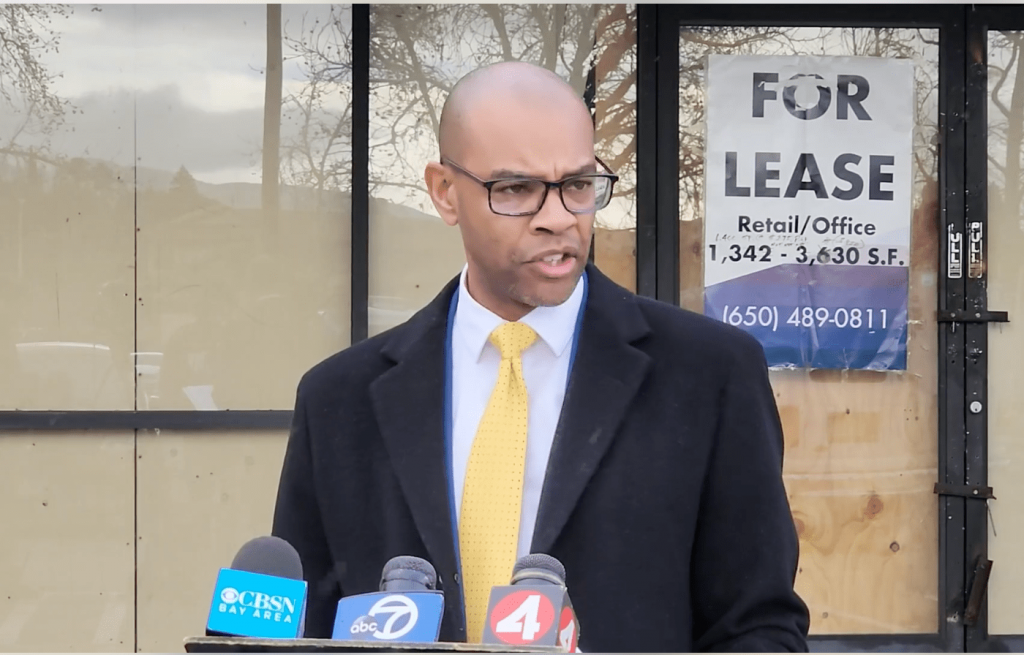Many in Antioch have had just about enough of the longtime, blighted, boarded-up storefronts that have become magnets for trash dumping, drug use and other illicit activities.
Antioch Mayor Lamar Thorpe for one is proposing the city do what it can legally to clean up these eyesores where city code enforcement and fines have not worked, an idea he pitched at a press conference Tuesday and later again at a City Council special workshop he called afterward.
“Today this corridor is an iconic symbol of decades of economic decline, neglect and disinvestment as the city has bulldozed its way into southeast Antioch,” Thorpe said, standing in front of a closed storefront at the Delta Fair Shopping Center in west Antioch.
Some of the ideas the mayor is proposing include using legal measures against noncompliant corporate landowners, including seeking an injunction to prevent an absentee landlord from continuing what they’re doing; authorizing the city to step in to deal with health and safety issues; or getting the courts involved to appoint a health and safety receiver to handle the process. The city will also consider eminent domain to seize problem properties at a later date, he said.
“The question is, when are we going to start using the tools that are in front of us in order to take action?” Thorpe said.
Thorpe said Antioch is oversaturated with absentee corporate landlords, many who have neglected their commercial properties in older parts of the city, allowing them to fall into decay, some even housing dangerous homeless encampments.
The doors from the shuttered Food Maxx on Delta Fair Boulevard direct customers to a new location in Antioch, Calif. on Friday, Oct. 7, 2011. The former Food Maxx has sat empty since it shuttered but was condemned following a fire last year. (Sherry LaVars/Staff)
Once a thriving commercial area, the Delta Fair Shopping Center has been in decline for more than decade, with anchor store FoodMaxx closing its doors in 2011. In October, homeless residents allegedly started a fire inside the store, which was later condemned along with two stores attached to it. A fence the landlord installed has done little to keep people out.
“There shouldn’t have been an encampment inside these buildings,” Thorpe said. “…The city doesn’t own these properties. Corporations own these properties. And you have to be responsible for your property.”
Even so, the mayor said the city hasn’t done enough up until now to encourage landlords to keep their properties up.
“The city’s approach has been conservative with absent corporate landlords, which is to do the bare minimum using code enforcement and hopes that the private sector will swoop in one day and save us all,” he said. “Well, they haven’t.”
The last major interest in the 73,546-square-foot shopping center was in 2020 when a developer proposed transforming the blighted site into a 210-unit apartment complex and small retail center. But the plans were put on indefinite hold after some council members questioned whether the applicant, who owned numerous other properties in the city, would fix the center’s many code violations or keep up the proposed new complex.
Though the city had hoped to work things out with the developer, Chui Family LLC did not return to the table. At the time, Gabriel Chui said he would take his money and “invest it elsewhere.”
But Thorpe said he thinks the site, which is surrounded by apartments, should be able to attract new tenants, especially with the new commercial infill housing overlay district, which allows for additional uses like mixed retail with housing.
“I don’t think that that has to be empty. I think that they can find a tenant. I think that they can look at the new overlay (zoning) and opportunities for new investment with developers …to bring multi-family housing here,” he said.
During the informational workshop later that night, one Antioch resident noted the pitfalls that property owners could face.
“You can only get the consumers to show up if they want to show up,” Andrew Becker said. “And so there’s the pitfall, there’s the disparity because how does a consumer feel welcomed onto a property if they feel that it’s blighted?
“And how does that property owner uplift their property if they’re suffering because of the market values that the region has brought and the economic disparities that this city suffers from?”
Lesslie May, meanwhile, said she’s seen the blighted shopping center, which she thinks has “serious health and safety codes.”
“I do feel it’s time we do something,” she said. “We cannot let this city just keep looking like this just like from the time I moved here. It’s like ‘come on now.’”
The council later went into closed session to consider possible action against nine properties, but when it emerged, no action was reported. The council is expected to discuss the matter again at its next closed session and will also will consider the use of eminent domain during a meeting in February.


